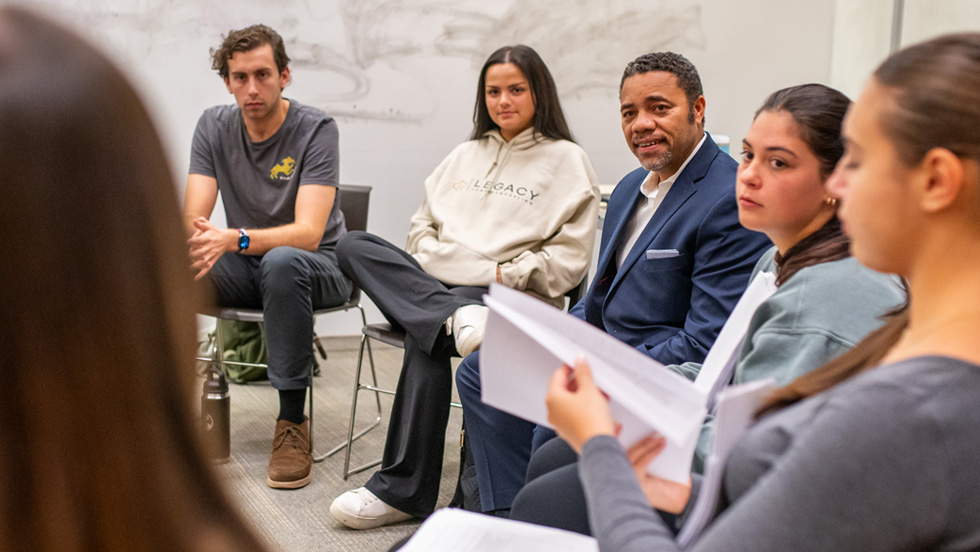
His evolving role reflects how Derner's Office of the Dean is expanding the School's Teaching Fellows and graduate programs during a time when the nation needs more psychologists.
The Gordon F. Derner School of Psychology is poised for growth. Its flagship initiatives, such as the Teaching Fellows and the Mentoring Future Psychologists program, continue to expand and experience ongoing success. At the undergraduate level, the psychology program continues to thrive as more students declare the major, while the burgeoning neuroscience program is seeing growth in its faculty and students. Meanwhile, the mental health counseling program is also growing: Where the program once enrolled only about 20 students, it currently has 45.
These statistics were shared by Errol Rodriguez, PhD, assistant dean and program director of the master’s degrees programs in psychology and mental health counseling. Alongside the continued success of his programs and the Derner School at large, Laura Brumariu, PhD, associate professor and former director of the PhD program, and Kate Fiori, PhD, professor and former chair of the undergraduate psychology department, have joined the dean’s office as the interim associate dean of professional programs and student involvement and the interim associate dean of foundational psychology and faculty involvement, respectively.
“It’s been a pleasure to work alongside Kate and Laura thus far in the previous roles. I look forward to working with them and Dean Muran [J. Christopher Muran, PhD] in their expanded roles,” Dr. Rodriguez stated.
The changes seen in his program and across the Derner School reflect the School’s success, but also a national need for psychologists—particularly those able to address substance abuse issues in their clients.
“This is a significant jump at the graduate level,” Dr. Rodriguez continued. “We see a lot of growth potential for all the programs we have in the school, from the undergraduate all the way up to our postgraduate programs. So, me assuming these additional responsibilities, along with sharing a leadership role with our two associate deans, is to complete that vision to bring that expansion to our programs.”
Programs That Address Addiction
The timing comes as substance abuse issues like opioid addiction have worsened. According to Dr. Rodriguez, about 46 million people struggled with a substance use disorder in the past year, and mood disorders and anxiety have increased as well. Dr. Rodriguez, who has nearly 25 years of clinical experience treating a range of psychological issues with particular expertise in addiction, said he sees the Derner School at all degree levels in a position to “do some good in the community, whether it’s the community around Adelphi or the tristate area.”
“We generally accept the idea that about four people are affected by one person’s substance use,” he said. “If that’s true, then we know that we’re probably looking at somewhere over 120 million people who are affected by their own use or the use of someone they care about. We have our work cut out for us, and I feel like we are really well positioned to do that in Derner.”
Dr. Rodriquez created the Substance Abuse Counseling concentration in 2012. It’s designed to satisfy the requirements for the certification awarded by the New York State Office of Addiction Services and Supports, CASAC-T training permit.
Helping Those Who Struggle With Substance Abuse
Dr. Rodriguez has spent more than 25 years in the field of substance abuse. “I saw the struggle that a lot of people experienced dealing with substance use. I also saw the other effects of it on the family, particularly the children, the dual diagnostic issues where people struggle with more than substance abuse, and I had to work on understanding the cross-cultural presentation that looked the same across many cultures. Alcohol doesn’t discriminate,” he said.
“Addiction is driving the demand for clinical services today, along with just incredible rates of anxiety and depression,” he added. “Our training is preparing students very well for what they’re going to face in the real world immediately upon graduation.”